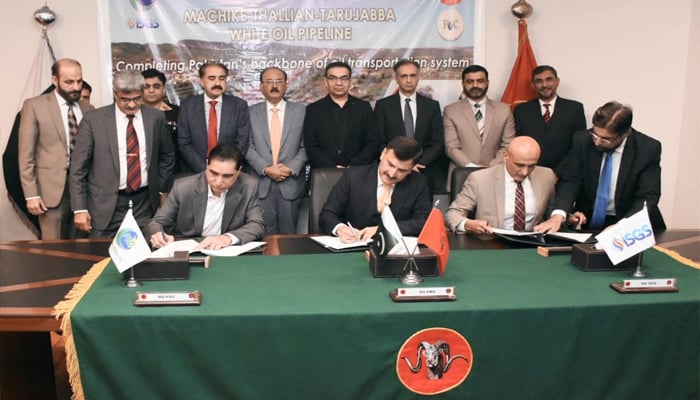PSO, FWO sign deal for 427-km white oil pipeline project
KARACHI: The state-owned Pakistan State Oil (PSO), a gas firm and a military engineering group signed a memorandum of understanding on Wednesday to build a pipeline that will transport petroleum products from Karachi to Peshawar, a statement said.
The Machike-Thallian-Taru Jabba White Oil Pipeline (MTT-WOP) project, which will span 427 km (265 miles), is expected to improve the efficiency and safety of oil transportation in the country, as well as reduce traffic congestion and environmental pollution.
The project will be led by the Frontier Works Organization (FWO), a military engineering group, and supported by PSO and Inter State Gas Systems Pvt. Ltd (ISGS).
The signing ceremony took place at the Special Investment Facilitation Council (SIFC) Secretari atthe prime minister's office, where the minister for power and petroleum, Muhammad Ali, and other senior officials were present.
The pipeline will have three segments: Machike-Chakpirana, Chakpirana-Rawat and Rawat-Tarujabba. six million metric tons per annum (MTPA) of petroleum products, facilitating a smoother supply chain from Karachi to Peshawar.
The pipeline will connect Punjab from Machike, near Lahore, to Tarujabba, near Peshawar, through three segments: Machike-Chakpirana, Chakpirana to Rawat, and Rawat to Tarujabba. With Punjab and KPK jointly demanding 74 percent of the nation's oil, timely pipeline development is crucial.
The project aims to complement the existing oil pipeline backbone from Karachi to Peshawar, ensuring efficient transportation of petroleum products, preventing adulteration, and enhancing safety measures. Additionally, it is anticipated to significantly reduce traffic congestion, environmental pollution, and transportation costs.
-
 Jelly Roll Explains Living With 'severe Depression'
Jelly Roll Explains Living With 'severe Depression' -
 Charli XCX Applauds Dave Grohl’s 'abstract' Spin On Viral ‘Apple’ Dance
Charli XCX Applauds Dave Grohl’s 'abstract' Spin On Viral ‘Apple’ Dance -
 Anna Sawai Opens Up On Portraying Yoko Ono In Beatles Film Series
Anna Sawai Opens Up On Portraying Yoko Ono In Beatles Film Series -
 Eric Dane's Wife Rebecca Gayheart Shares Family Memories Of Late Actor After ALS Death
Eric Dane's Wife Rebecca Gayheart Shares Family Memories Of Late Actor After ALS Death -
 Palace Wants To ‘draw A Line’ Under Andrew Issue: ‘Tried And Convicted’
Palace Wants To ‘draw A Line’ Under Andrew Issue: ‘Tried And Convicted’ -
 Eric Dane's Girlfriend Janell Shirtcliff Pays Him Emotional Tribute After ALS Death
Eric Dane's Girlfriend Janell Shirtcliff Pays Him Emotional Tribute After ALS Death -
 King Charles Faces ‘stuff Of The Nightmares’ Over Jarring Issue
King Charles Faces ‘stuff Of The Nightmares’ Over Jarring Issue -
 Sarah Ferguson Has ‘no Remorse’ Over Jeffrey Epstein Friendship
Sarah Ferguson Has ‘no Remorse’ Over Jeffrey Epstein Friendship -
 A$AP Rocky Throws Rihanna Surprise Birthday Dinner On Turning 38
A$AP Rocky Throws Rihanna Surprise Birthday Dinner On Turning 38 -
 Andrew Jokes In Hold As BAFTA Welcomes Prince William
Andrew Jokes In Hold As BAFTA Welcomes Prince William -
 Sam Levinson Donates $27K To Eric Dane Family Fund After Actor’s Death
Sam Levinson Donates $27K To Eric Dane Family Fund After Actor’s Death -
 Savannah Guthrie Mother Case: Police Block Activist Mom Group Efforts To Search For Missing Nancy Over Permission Row
Savannah Guthrie Mother Case: Police Block Activist Mom Group Efforts To Search For Missing Nancy Over Permission Row -
 Dove Cameron Calls '56 Days' Casting 'Hollywood Fever Dream'
Dove Cameron Calls '56 Days' Casting 'Hollywood Fever Dream' -
 Prince William, Kate Middleton ‘carrying Weight’ Of Reputation In Epstein Scandal
Prince William, Kate Middleton ‘carrying Weight’ Of Reputation In Epstein Scandal -
 Timothée Chalamet Compares 'Dune: Part Three' With Iconic Films 'Interstellar', 'The Dark Knight' & 'Apocalypse Now'
Timothée Chalamet Compares 'Dune: Part Three' With Iconic Films 'Interstellar', 'The Dark Knight' & 'Apocalypse Now' -
 Little Mix Star Leigh-Anne Pinnock Talks About Protecting Her Children From Social Media
Little Mix Star Leigh-Anne Pinnock Talks About Protecting Her Children From Social Media




